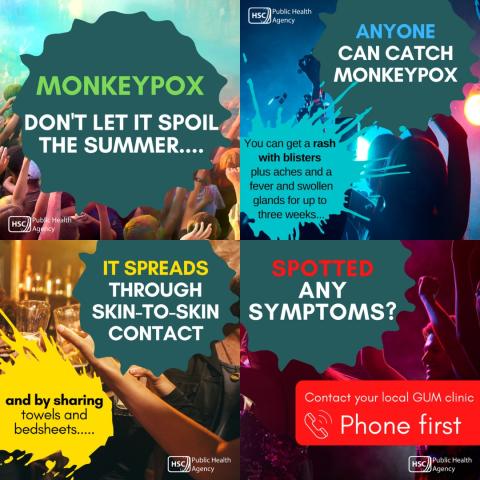Update on monkeypox

The Public Health Agency (PHA) is continuing to urge people to be vigilant about monkeypox, and it is important that anyone who is offered the smallpox vaccine takes up that offer when available to help protect themselves and others.
While anyone can catch monkeypox, the majority of monkeypox cases in the UK continue to be in gay, bisexual and other men who have sex with men (GBMSM), with the infection being passed on mainly through close contact between people in connected sexual networks. Therefore, the smallpox vaccine is being prioritised for those men at higher risk of getting the virus, as well as some contacts of cases and some healthcare professionals.
An individual’s eligibility for vaccination depends on a number of factors, similar to the criteria used to assess those eligible for HIV pre-exposure prophylaxis (PrEP), even if they are already living with HIV. Eligibility is detailed in the UKHSA vaccination strategy which was endorsed by the Joint Committee on Vaccination and Immunisation (JCVI). The PHA is rolling out the vaccine programme across all Health and Social Care Trust areas to those assessed as being most at risk.
UKHSA has secured one of the highest number of doses in the world, procuring 150,000 doses for the UK from the global manufacturer of smallpox vaccines, with an initial delivery of around 50,000 doses. There are global issues with supply due to vaccine availability and the necessary time to produce more vaccines. This means the further doses, which are being made to order, will be received later in September 2022. The PHA is continuing to work with partners across the UK to arrange for the supply of further vaccines into Northern Ireland, which will be given to people according to need.
So far, 1,120 have been allocated to Northern Ireland. The number of GBMSM currently eligible for vaccination is estimated to be around 2,500, although this will be kept under ongoing review.
Dr David Cromie, Consultant in Health Protection at the PHA, said: “Some eligible people will be asked to wait while stocks of vaccine are manufactured and distributed. Until the delivery of further doses in September, GUM clinics will continue to vaccinate in line with any residual supplies, and work to ensure that those who are not already in touch with services know where and how to access vaccination.
“There is no need to phone, as GUM clinics will keep a record of those eligible so that they can be invited forward for vaccination as soon as new supply becomes available.”
There is a leaflet on the PHA website explaining why some are being asked to wait which can be found at www.pha.site/whydoIhavetowait
This leaflet explains that there is a limited supply of the MVA vaccine so, initially, one dose is being offered to those at highest risk. As more vaccine supplies become available, more people will be offered the first dose of the vaccine.
Dr Cromie continued: “Latest figures show Northern Ireland has 27 cases. Whilst this is a positive sign that cases are remaining steady, ongoing vigilance is urged, given it’s too soon to determine if this will be sustained.
“We are continuing to work with partners to ensure people in the GBMSM community know the signs and symptoms of monkeypox and how to seek help if they have concerns.”
“Before attending any group events including bars, clubs and outside events, check yourself for monkeypox symptoms, including rashes and blisters. If you have monkeypox symptoms, do not attend events or engage in any physical contact until you’ve called a GUM clinic and been assessed by a clinician. It can take up to three weeks for symptoms to appear after being in contact with someone with monkeypox, so stay alert for symptoms after you have skin to skin or sexual contact with someone new.”
You should phone your local GUM clinic or healthcare provider immediately if you have a rash with blisters and either, you:
- have been in close contact with someone who has or might have monkeypox (even if they have not been tested yet) in the past three weeks
- have been to west or central Africa in the past three weeks
- are gay, bisexual or MSM
Tell the person you speak to if you have had close contact with someone who has or might have monkeypox.
Phone first
Do not go to a GUM clinic or other healthcare facility without phoning first. Stay at home and avoid close contact with other people until you’ve been told what to do.
For further information on monkeypox see www.gov.uk/guidance/monkeypox
